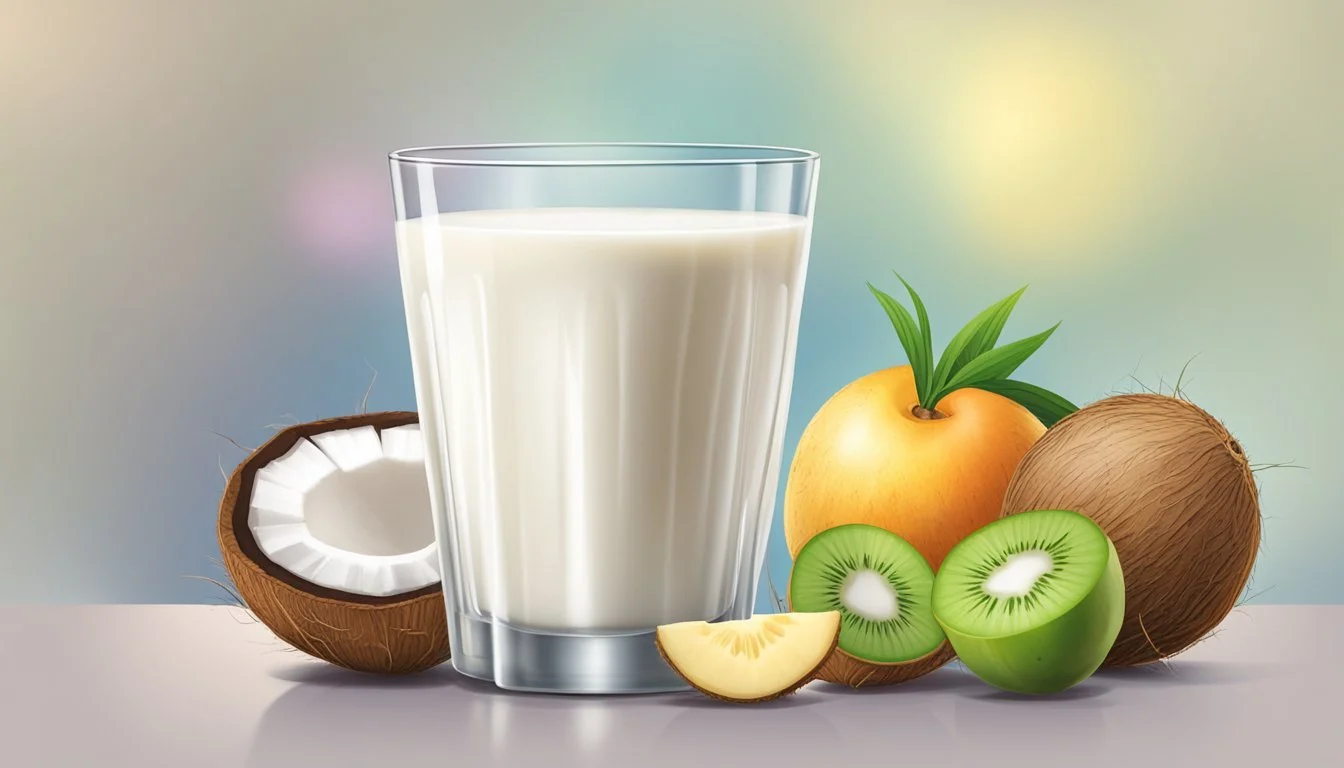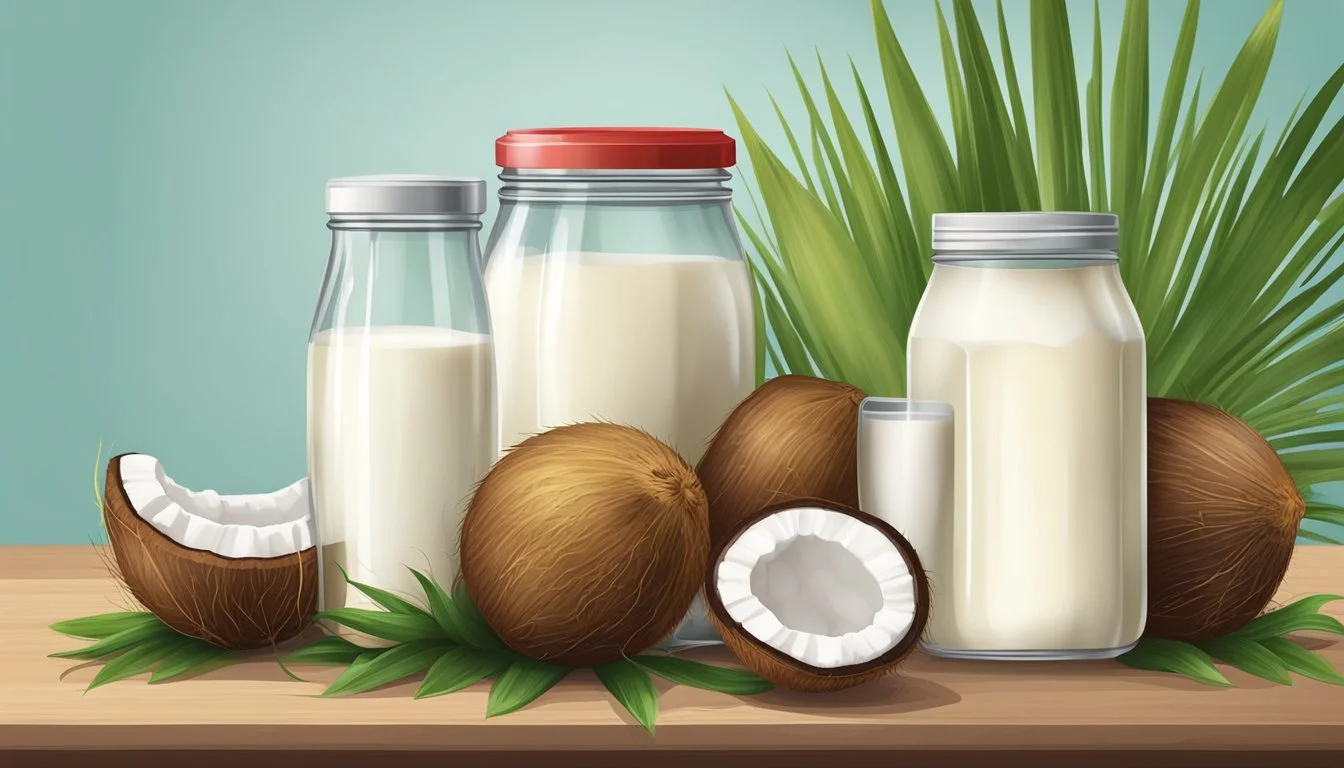Is Coconut Milk a Healthy Alternative to Cow's Milk?
Unveiling Nutritional Benefits and Considerations
Coconut milk, extracted from the flesh of coconuts, offers a plant-based alternative to cow's milk that aligns with various dietary preferences and restrictions. With a growing interest in dairy-free options, many people look to coconut milk for its creamy texture and tropical flavor which make it a versatile choice in the kitchen. Notably distinct in its nutritional profile, coconut milk contains medium-chain triglycerides (MCTs), manganese, copper, iron, and fiber. These attributes contribute to its reputation as a desirable substitute for traditional dairy.
On the other hand, cow's milk has been a staple in many cultures for centuries, valued for its rich supply of vitamin B12, B2, calcium, and vitamins D and A. These nutrients play crucial roles in bone health, energy production, and overall well-being. Cow's milk is also widely used across culinary applications, from baking to making sauces, and is praised for its ability to enrich a wide variety of dishes with its mild flavor and nutritional benefits.
In evaluating whether coconut milk is a healthy alternative to cow's milk, it is essential to consider individual dietary needs, preferences, and any potential intolerances or allergies. While coconut milk provides beneficial fats and can be enriched with vitamins and minerals, it naturally offers less calcium and vitamin D than cow's milk. Consumers often weigh these differences alongside environmental and ethical considerations as they make informed choices about including coconut milk in their diets.
Nutritional Profile Comparison
The nutritional profiles of coconut milk and cow's milk differ significantly, with variations in calorie content, protein, types of fats, and carbohydrate levels. Understanding these differences is essential for making an informed choice based on dietary needs and health goals.
Caloric Content
Coconut Milk: A 240-ml cup typically contains about 552 calories.
Cow's Milk: The same serving size of whole cow's milk has roughly 150 calories.
Protein Content
Cow's Milk: It is higher in protein, with about 8 grams per cup.
Coconut Milk: Contains less protein, contributing about 5 grams per cup.
Fat Types and Content
Saturated Fat:
Coconut Milk: High in saturated fats, with 43 grams per cup.
Cow's Milk: Contains less, with 5 grams of saturated fat per cup.
Total Fat:
Coconut Milk: Approximately 48 grams of total fat per cup.
Cow's Milk: Whole milk has 8 grams of total fat per cup.
Carbohydrates and Sugars
Cow's Milk: Offers around 12 grams of carbohydrates, with natural sugars primarily in the form of lactose.
Coconut Milk: Typically lower in carbohydrates, but may contain added sugars, depending on the product.
Health Benefits and Risks
Coconut milk is a plant-based alternative to cow's milk that offers a unique nutritional profile, including potential health benefits and some risks. Given its fat content and various nutrients, consumers often weigh its impacts on heart health, bone health, anti-inflammatory properties, and weight management.
Heart Health
Coconut milk is high in saturated fats, specifically medium-chain triglycerides (MCTs), which may have a positive effect on cholesterol levels. Studies suggest that MCTs can help to increase the body's levels of HDL (good) cholesterol. However, the high amount of saturated fat, which constitutes about 93% of its calories, may contribute to higher LDL (bad) cholesterol when consumed in excess, posing a risk to heart health.
Bone Health
In comparison to cow’s milk, coconut milk naturally provides less calcium, which is essential for maintaining strong bones and preventing osteoporosis. However, fortified versions of coconut milk are available, enhancing its calcium content. It is often enriched with other vitamins and minerals to support bone health.
Anti-Inflammatory Properties
Coconut milk contains antioxidants that may offer anti-inflammatory benefits. These antioxidants help combat oxidative stress, which can lead to inflammation. It's the presence of these anti-inflammatory compounds that potentially contributes to managing conditions associated with chronic inflammation.
Weight Management
Regarding weight management, coconut milk is calorically dense, with one cup of canned coconut milk containing more than 550 calories. While weight loss can be stimulated by MCTs due to their potential to increase energy expenditure and fat oxidation, the high caloric content means portion control is crucial. Consuming coconut milk without adjusting overall calorie intake can lead to weight gain.
Dietary Considerations
When selecting between coconut milk and cow's milk, individuals should consider their nutritional needs, allergies, and dietary preferences.
Lactose Intolerance and Allergies
For those with lactose intolerance, coconut milk serves as a dairy-free alternative, devoid of lactose, reducing the risk of adverse reactions. Cow's milk, while nutritionally rich, can cause discomfort ranging from mild to severe in lactose-intolerant individuals. Additionally, a milk allergy—an immune reaction to proteins found in cow's milk—can be circumvented by choosing coconut milk.
Vegan and Plant-Based Diets
Coconut milk aligns with vegan and plant-based dietary patterns as it's derived from the flesh of coconuts and involves no animal products. In contrast, cow's milk does not fit into these diets due to being an animal product.
Dietary Restrictions and Sensitivities
Coconut milk may fulfill various dietary restrictions and food sensitivities. It is gluten-free by nature, making it a suitable choice for those with gluten intolerance or celiac disease. However, some individuals might have specific sensitivities to coconut itself. It's crucial when considering coconut milk, to ensure that it doesn't conflict with personal food sensitivities or health conditions.
Use in Recipes and as a Dairy Substitute
As more individuals look for dairy-free alternatives, coconut milk emerges as a versatile option in various culinary applications due to its creamy consistency and ability to mimic dairy milk.
Baking and Cooking
In baking, coconut milk can successfully replace dairy milk on a one-to-one basis. This makes it a convenient choice for those seeking lactose-free or vegan ingredients. Its moisture adds to the texture of cakes and pastries, and its subtle sweetness can enhance the flavor of many desserts. However, one should consider the potential impact of coconut milk's distinct flavor in savory dishes.
Beverage Additive
Coconut milk serves as an excellent addition to beverages, such as coffee and smoothies, where it can contribute a creamy texture similar to that of dairy milk or cream. The fat content in coconut milk enriches coffee, providing a taste experience that closely resembles the one obtained with traditional cow's milk or cream. For smoothies, its creamy consistency pairs well with fruits and vegetables, supporting the desired thickness without dairy.
Creaminess and Texture
In recipes calling for a creamy element, coconut milk is an exceptional substitute. It can stand in for creams or yogurts, providing a desirable thickness in soups, sauces, and curries that usually rely on dairy products. When it comes to achieving the rich mouthfeel often associated with dairy, coconut milk excels, thereby finding its place even in the heartiest of recipes where creaminess is key.
Environmental and Ethical Considerations
When exploring coconut milk as an alternative to cow's milk, it is crucial to consider the sustainability of its production and the welfare of the animals involved. These factors often influence consumer choices in the growing plant-based milk market.
Sustainability
Coconut milk production has a generally lower environmental impact compared to cow's milk. Key points include:
Greenhouse Gas Emissions: The production of cow's milk is associated with higher greenhouse gas emissions, including methane, mainly due to enteric fermentation in cattle.
Land Usage: Cow's milk production requires more land, for the cows themselves and to grow their feed, whereas coconut trees can grow in diverse tropical conditions and use less land over time.
Water Usage: Growing almonds for almond milk is water-intensive, especially in drought-prone regions such as California. Coconut trees, by contrast, typically need less water than almond trees.
However, it is also worth noting that the transportation of coconut products from tropical regions where they grow to consumers worldwide can contribute to carbon footprints.
Animal Welfare
In comparison to plant
Varieties and Forms of Coconut Milk
Coconut milk is available in different forms and varieties, catering to various dietary preferences and cooking needs. It ranges from thick and creamy options ideal for culinary purposes to lighter versions suitable for drinking.
Canned vs. Carton
Canned Coconut Milk typically has a thicker consistency and is often used in cooking, providing a rich texture suitable for sauces and curries. It contains coconut cream and sometimes coconut water, resulting in a higher fat content than its carton counterpart.
Ingredients: Often includes coconut cream and water, occasionally stabilizers, or emulsifiers
Uses: Ideal for culinary uses such as soups, stews, and desserts
Carton Coconut Milk Beverage is a more diluted version, often fortified with vitamins and minerals, making it more akin to cow's milk in terms of usage. It is generally found in the dairy section of grocery stores.
Ingredients: A blend of water and coconut milk, often fortified with vitamins and minerals
Uses: Suitable for drinking, cereals, and smoothies
Sweetened vs. Unsweetened
Sweetened Coconut Milk contains added sugars, enhancing the flavor for certain palates and recipes. It can be found in both canned and carton forms and is typically labeled as "sweetened."
Sugar Content: May vary; check labels for specific amounts
Uses: Preferred for desserts and beverages where a touch of sweetness is desired
Unsweetened Coconut Milk has no added sugars, making it a preferable choice for those monitoring their sugar intake. It retains the natural flavor of coconut and is available in both canned and carton varieties.
Sugar Content: Contains natural sugars only
Uses: A versatile option for both culinary preparation and direct consumption
Blended Milk Options
Blended coconut milk products combine coconut milk with other plant-based milks such as almond, rice, or cashew milk. These blends offer a balance of flavors and often come with reduced calories and fat.
Almond-Coconut Milk: A nutty, lower-calorie blend ideal for cereals and smoothies.
Rice-Coconut Milk: A slightly sweeter, less creamy option typically enriched with vitamins.
Hemp-Coconut Milk: Combines the slight nuttiness of hemp with the tropical flavor of coconut.
These products can be found in unsweetened versions and may cater to those with dietary restrictions or preferences, such as avoiding tree nuts or seeking a creamier texture without the full fat content of traditional coconut milk.
Consumer Information
When considering coconut milk as a substitute for cow's milk, consumers should be aware of labeling practices, cost implications, and how to properly store the product for maximum longevity.
Labeling and Marketing Claims
Unsweetened vs. Sweetened: Coconut milk often comes in unsweetened and sweetened varieties. Unsweetened coconut milk is lower in calories and sugar, making it a preferable choice for those monitoring their sugar intake. Sweetened versions, however, may contain added sugars, which could affect calorie count and nutritional value.
Low-Fat Options: Some coconut milk brands offer low-fat versions that contain fewer medium-chain triglycerides (MCTs), which are a form of saturated fat.
Nutrient Fortification: Like cow's milk, coconut milk can also be fortified with calcium and vitamins. Consumers should check labels to verify the calcium content, especially if they are relying on coconut milk as a primary source of this nutrient.
Claims of MCT Benefits: Marketing materials may highlight the presence of MCTs in coconut milk, suggesting possible health benefits. While MCTs have been associated with various health claims, it is important for consumers to seek out credible sources to verify these claims.
Cost and Accessibility
Price Comparisons: Generally, coconut milk can be more expensive than regular cow's milk. Prices can vary widely based on brand, region, and whether the product is organic or conventionally produced.
Availability in Different Markets: Coconut milk is widely available in most supermarkets, health food stores, and online platforms. However, consumers in India might find coconut milk to be more accessible and available in a wider variety due to its prevalence in the region’s cuisine and agriculture.
Shelf Life and Storage
Unopened Shelf Life: Coconut milk's shelf life varies by packaging. Canned coconut milk can last for several years if unopened, while carton-packaged coconut milk typically has a shorter shelf life.
Storage Instructions:
Unopened: Store in a cool, dark place away from heat sources.
Opened: Refrigerate and use within 4-7 days for best quality.
Freezing Coconut Milk: While freezing is an option, it can change the consistency and texture of the milk, thus storing it in the refrigerator is generally recommended for retaining its quality.






